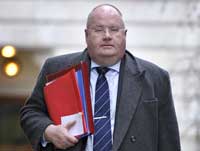
Moves by the government to review statutory social care duties could dilute the role of the local authority social worker, experts have warned.
Last week, the Department for Communities and Local Government opened a consultation to examine all council statutory duties as part of a wide-ranging review for secretary of state Eric Pickles. The DCLG is seeking views on which duties are essential and which could be removed.
“This consultation could result in a huge reduction in the duties performed by local authority social workers – reducing the role of the state which is in line with this government’s agenda,” said child protection consultant Perdeep Gill.
Any changes were likely to be to statutory guidance and regulations, rather than primary legislation, she said. The government could change child protection thresholds or allow multi-disciplinary professionals rather than social workers only to undertake section 47 investigations, for example.
Unless the government disputes this, Gill said the moves could signal a “roll-back of the protected social work role”.
This was a theme taken up by Nushra Mansuri, professional officer for the British Association of Social Workers – the College of Social Work. “The role of social workers should be strengthened, as the Social Work Taskforce recommended, not diminished as this consultation could well be seeking to do,” she said. “The government should not even be entertaining changes to these critical duties.”
Corinne May-Chahal, interim co-chair of the College of Social Work hosted by the Social Care Institue of Excellence, urged the government not to water down the Children Act 1989 and the duties it placed on councils. She said these were “vital safeguards in protecting the right of children to a life free of violence and harm …and the basis of good practice in child protection social work”.
She added: “It is of paramount importance that the government issues an early reassurance that statutory duties under the Children Act 1989 will be preserved.”
May-Chahal underlined the importance of three sections in particular: s17, which protects children in need; s20, which ensures children are looked after when their families can no longer do so; and s47, which ensures that suspicion of harm is investigated properly.
One social worker, writing on Twitter, questioned whether the moves were to increase accountability and responsibility for social enterprises carrying out social work functions.
Although no council has yet outsourced child protection, some local authorities, including Harrow in London and Suffolk, have already contracted out elements of their children’s services to the private and voluntary sectors. Suffolk is understood to be looking to outsource child protection but social care lawyers have said that, to do so, the law would need to be changed.
The DCLG said: “The department is reviewing the overall burden of statutory duties. Some duties will clearly remain vital, others may no longer be needed or may create unnecessary burdens or restrictions on local authorities. It is entirely misleading and inaccurate to imply that we will weakening support for children at risk.”
However, a spokesperson was unable to comment on which duties would remain vital nor on who would carry them out.
Lisa Nandy, Labour MP for Wigan, said that, if duties towards vulnerable groups were not under threat, they should be removed from the government’s consultation or never included in the first place.
What do you think? Join the debate on CareSpace
Keep up to date with the latest developments in social care. Sign up to our daily and weekly emails
Related articles


 Bournemouth, Christchurch and Poole
Bournemouth, Christchurch and Poole  Hampshire County Council
Hampshire County Council  Lincolnshire County Council
Lincolnshire County Council  Norfolk County Council
Norfolk County Council  Northamptonshire Children’s Trust
Northamptonshire Children’s Trust  South Gloucestershire Council
South Gloucestershire Council  Wiltshire Council
Wiltshire Council  Wokingham Borough Council
Wokingham Borough Council  Children and young people with SEND are ‘valued and prioritised’ in Wiltshire, find inspectors
Children and young people with SEND are ‘valued and prioritised’ in Wiltshire, find inspectors  How specialist refugee teams benefit young people and social workers
How specialist refugee teams benefit young people and social workers  Podcast: returning to social work after becoming a first-time parent
Podcast: returning to social work after becoming a first-time parent  Podcast: would you work for an inadequate-rated service?
Podcast: would you work for an inadequate-rated service?  Family help: one local authority’s experience of the model
Family help: one local authority’s experience of the model  Workforce Insights – showcasing a selection of the sector’s top recruiters
Workforce Insights – showcasing a selection of the sector’s top recruiters 

 Facebook
Facebook X
X LinkedIn
LinkedIn Instagram
Instagram
Comments are closed.